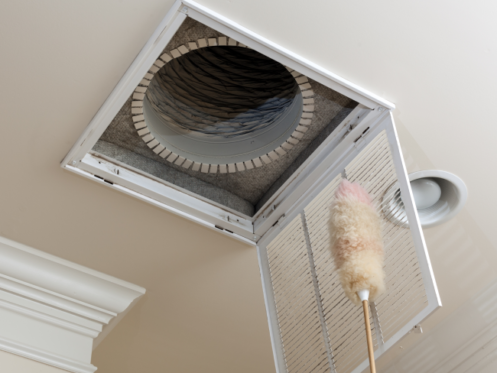Ending the summer is something most of us dread, from losing daylight and the warm weather to preparing for winter. As you begin preparing for the inevitable, don’t forget to give your air conditioning a little attention too. Here are some important maintenance tips for your AC before you shut it off at the end of the summer.
What Maintenance Does for Your System
It is critical for your system to have routine maintenance to keep it running properly. When you ignore your air conditioner, the operational strain slowly increases along with your utility costs.
To continue working effectively, your AC must circulate air through the system and through the outdoor unit. It must also circulate refrigerant and regulate its pressure.
The goal of maintenance is to ensure that your system can do all of this at the engineered optimal level. This helps your system achieve its intended service life, reduces utility costs, and prevents strain-related repairs.
As a part of maintenance, a technician tests each component within your system. The goal is to catch small problems before they add strain to the system and cause substantial repairs.
Does End-of-season Maintenance Still Help?
Air conditioning maintenance is generally recommended in the spring before you start depending on it during the hottest weather. This ensures that your system is operating at peak efficiency for the entire season, keeping strain and costs low.
End-of-season maintenance tasks are just as important as those at the beginning of the season. However, you’ll want to reap the benefits that differ from those of the spring maintenance.
One of the challenges of owning and maintaining an air conditioner is unplanned repairs. These are commonly ignored until a catastrophic failure, or they change summer plans to cover the costs. When you perform end-of-season maintenance, you oftentimes can anticipate repairs for the next season.
Some of your system is used for both your air conditioning and your heating. When you perform the right maintenance, you also set yourself up for an easier heating season.
Finally, you never quite know when you’ll need to start your air conditioning in the spring. By giving attention to some maintenance tasks now, you lessen the spring stress.
Check Your Air Filter
One of the first things to check is your air filter as it is the gateway to your system. This gets clogged relatively quickly being that its entire job is to prevent contaminants from entering your system.
The general recommendation for the common 1-inch filter is to replace it about every 90 days. However, given the sometimes dusty environment around Denver, your filter may need more frequent changing.
If you haven’t checked your filter recently, be sure to check it now. If it’s not time to replace it, consider gently vacuuming off the dirty side of the filter, known as the intake side. Just be sure to replace it before switching over to your heating for the season.
Look at Your Vents
Next, look at your vents for signs of excessive dust and dirt buildup around the edges. This indicates not only possible dirty ducts but also a buildup of contaminants in your system. Common areas to collect these contaminants are the evaporator coil, heat exchanger, and circulating fan.
While looking at your vents, ensure that they are open and clear of obstructions. Your vents need at least a 2-inch clearance around and above them to make sure that air can circulate freely.
Check for Storm Damage
Summer storms that move through the area can disrupt and damage infrastructure, including your air conditioner. Fortunately, many homeowner’s insurance policies will cover storm-related damage to your air conditioner. File your claim quickly to ensure the insurance company ties it to the storm.
If your system still seems to be running well, inspect the condensing unit for signs of damage. The most obvious are significant dents or cracks in the unit’s housing. Also, look for any debris larger than leaves and grass caught anywhere in the unit.
Clear Debris From Your Condensing Unit
While you’re at your condensing unit, clear away any debris from around it. Over the summer, it is easy to let grass and weeds grow up, especially behind the unit. Branches from trees, shrubs, and bushes grow over the summer too and may get too close.
The rule of thumb is to keep at least a 12-inch clearance around and above your unit. Anything closer may inhibit air from flowing freely through the condensing coil. Taking care of this now ensures you don’t have as much to do to prepare your AC next spring.
Check Your Air Temperature
Believe it or not, you should take your air conditioner’s temperature occasionally. While you can’t stick a thermometer under its tongue, you can easily check it using a meat thermometer. You’re not looking for a specific temperature but rather a difference between the room temperature and the air coming out.
Start by setting the thermometer out in a room with a return vent, and give it a few minutes to acclimate. Once you’ve recorded the room temperature, put the probe into an output vent and give it another minute. The difference between what’s coming out versus the room temperature should be at least 15 degrees.
If the temperature difference is less than 15 degrees, you have an issue either with low refrigerant or with the heat transfer process. A technician will help you identify the underlying problem, and you have some time to plan for the repair.
Feel for Air Movement
Along with checking the temperature of the air coming from your vents, also be sure to check the air volume. Fortunately, this is much easier than checking the temperature and requires nothing more than a bare hand or foot.
Put your foot or hand in front of a vent while your system is running. If you barely feel the air coming out, you have some kind of airflow restriction. Regardless of the cause, any airflow disruption will affect both the performance of your air conditioner and furnace.
Get Professional Maintenance
If you have not yet had your system professionally maintained this year, now is a great time to get it done. You’ve missed the spring rush and are ahead of the fall maintenance rush.
Most manufacturers have a 5- or 10-year warranty for their system. However, a term of those warranties is often professional routine maintenance. Skipping your maintenance this year may invalidate your warranty when you need it most.
In addition, professional maintenance will uncover any problems with components running suboptimally. Finding this now allows you time to budget for and plan the repairs before you get into the heat next summer. This is especially important if your system has reached the end of its service life and requires a replacement.
Summit Heating & AC has offered trusted heating, cooling, and plumbing services to residents around Denver since 1998. Our team offers reliable heating and air conditioning installation, maintenance, and repair combined with indoor air quality solutions. Call to schedule your maintenance with one of our expert technicians today.


